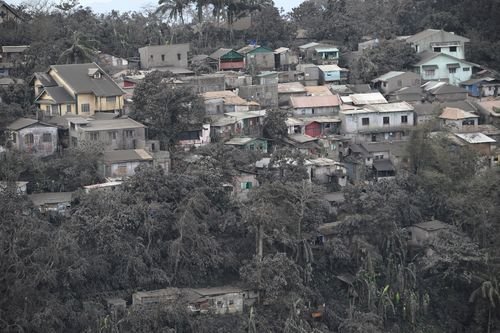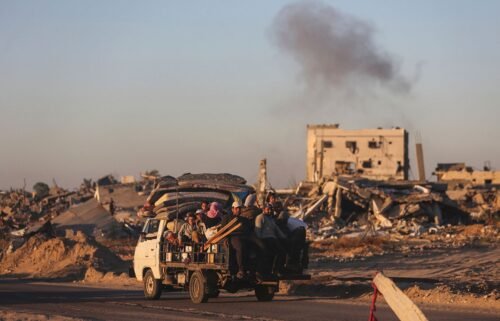Residents urged not to return home as Philippines volcano continues to spew ash, lava fountains

Philippine officials are appealing to residents not to return to their homes in the danger zone of an erupting volcano as it continues to spew plumes of ash and lava fountains, with earthquakes regularly shaking the ground.
The Taal Volcano, about 37 miles (60 kilometers) south of the capital Manila on the island of Luzon, began erupting on Sunday, sending ash up to nine miles (14 kilometers) into the air and prompting warnings of a possible “explosive eruption” and large-scale evacuations.
As of Tuesday, almost 20,000 people from Batangas and Cavite provinces have sought shelter in 118 temporary evacuation centers set up by authorities. The total number of evacuees is likely to be higher, with some choosing to stay with family members and relatives in other parts of the country.
Officials, however, said a number of residents were beginning to return to their homes close to the volcano to tend farms, livestock or fetch personal belongings.
Many people depend on the lake and land around the volcano for their livelihood. Their dilemma is whether to risk their lives by returning or their primary sources of income by staying in a shelter for an unknown period of time.
“If you were this person and think ‘well all I know for sure is I have three cows, seven goats and some soy beans and I don’t go back and take care of them, I know I’m screwed,’ than someone telling you to stay away for two weeks and maybe nothing happens — you’re in trouble anyway,” said Joseph Michalski, director of the Earth and Planetary Science division at the University of Hong Kong.
There are two concentric zones of concern around the volcano. Around 459,000 people reside within a dangerous zone within a 14-kilometer (8.6 miles) radius around the volcano, according to the United Nations Office for the Coordination of Humanitarian Affairs (OCHA), while more than 930,000 people live in a wider 17-kilometer (10.5 miles) danger zone.
The Philippine Institute of Volcanology and Seismology (PHIVOLCS) has requested a “total evacuation” of everyone within the larger 17-kilometer (10.5 miles) radius around the volcano.
Mariton Bornas, chief of volcano monitoring and eruption at PHIVOLCS said residents within the immediate radius would be at risk of tremors, fissures and the threat of a sudden pyroclastic flow.
The institute recorded 335 earthquakes in the area of the volcano since Sunday and said more activity is expected in the next few days.
“These new strong, continuous earthquakes that we are now experiencing are due to fissuring, which means that there really is magma that is still making its way out of Taal,” Bornas said.
“PHIVOCS strongly reiterates the need for the evacuation of Volcano Island, Taal Lake and the high-risk areas surrounding the volcano … located within the immediate 14-kilometer radius from the main crater,” she continued.
Eruption difficult to predict
Activity at the volcano continued through Tuesday. Lava fountains generated dark gray steam-laden plumes that reached 800 meters (2,624 feet) high, according to the institute. Volcanic lightening was also visible.
PHIVOLCS said that new vents had opened up on the volcano’s northern flank and fresh ashfall had landed on nearby towns.
Photos from the eruption show ash mixing with rain, creating a thick black sludge that blanketed cars, streets, and homes in some towns. Ash is even heavier than snow, meaning excessive pile-ups, especially when mixed with rain, can cause roofs to collapse.
In a briefing with the media on Tuesday, PHIVOLCS director Renato Solidum said they cannot definitively tell when the eruptions will stop.
The alert level for the volcano remains at four, meaning an “explosive eruption” could happen in the coming hours or days. Its highest alert level is five, indicating an eruption is taking place.
But predicting what will happen, or when, is fraught with difficulty. When the Taal Volcano erupted in 1754 it lasted six months. The deadliest eruption took 1,335 lives in 1911, and it lasted a few days.
“There is no smoking gun or mathematic indicator of if a volcano erupts or when,” said Michalski of Hong Kong University.
Signals that eruptions are imminent or that there is activity going on include the frequency, location and depth of earthquakes, the water temperature of the lake increasing, and gas released from cracks or fissures.
“All these things, these activity increases, tell you that — man, I’m getting out of here. Something is happening. But none of this says exactly what will happen in exactly what time frame,” Michalski continued.
Ghost towns filled with ash
Federal authorities are helping the response and evacuation operation. The army sent 20 military vehicles and 120 personnel to help affected residents, and the secretary of national defense said helicopters were on standby to evacuate people.
Aid organizations like the Red Cross are assisting on the ground by sending rescue vehicles and supplies.
Richard Gordon, Chairman of the Philippine Red Cross said evacuated areas look like “ghost towns” with houses “filled with ash.”
“There’s been some rain, many have collapsed already,” Gordon said. “If you live in the area you’d probably be terrified.”
In Batangas and Cavite towns, power is down due to heavy ash collecting on the electricity lines and there is no fresh water, Gordon said.
Evacuation centers include basketball courts, gyms and schools and are not designed for large-scale evacuations.
Red Cross teams on the ground are working to provide water tankers, ambulances, hot meal vans, and masks, as well as providing psychological support and setting up 70-bed wards in heavily affected areas to care for people with respiratory problems caused by the ash.
“The situation there is very dusty, and certainly it gets into your lungs and can create long-term damage,” said Gordon. “We are advising people to close their windows with a damp cloth. People with respiratory illness or cardiovascular problems, they should move far away from the volcano to Manila or other provinces.”
The ash fall has also damaged crops in the area such as corn and coffee, and continues to threaten fish stocks, said Agriculture Secretary William Dar. Batangas province supplies Metro Manila with 40% of its harvest of fish, including tawilis or “live sardines” only found in the province.
A potential eruption could also bring long-term consequences for the area’s economy.
The volcano is surrounded by a lake, which is a popular attraction — meaning many of the towns in the vicinity are tourism hot spots. There are several amusement parks, lakeside resorts and yacht clubs within the 17-kilometer zone.
The holiday town of Tagaytay, which lies close to the water’s edge, is a popular getaway for Manila residents who often take boats onto the lake and hike up the volcano.
On Sunday, the volcanic ash spread as far as Quezon City north of Manila, prompting the suspension of all flights at the capital’s international airport. By Tuesday, normal operations resumed, according to the airport’s general manager Ed Monreal, though it’s possible flights may be suspended again if Taal’s activity increases.
The airport remains congested with people trying to get on flights, Monreal added.



